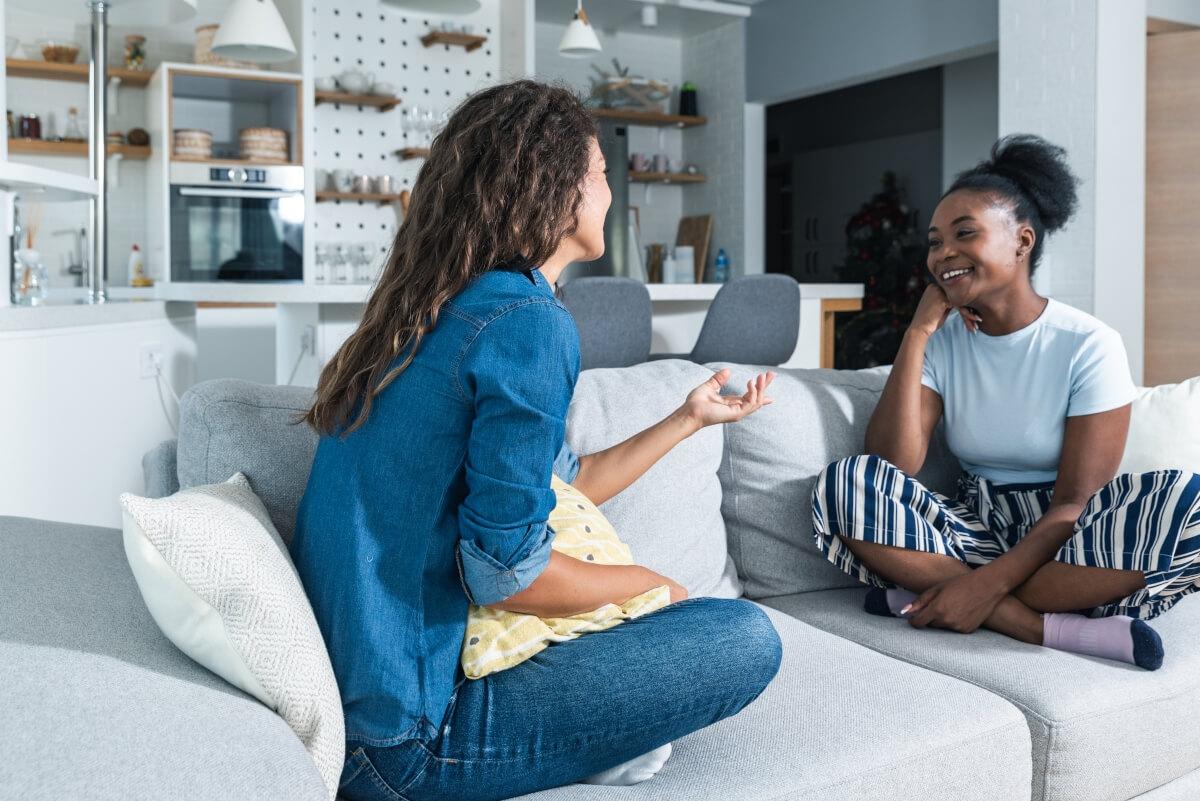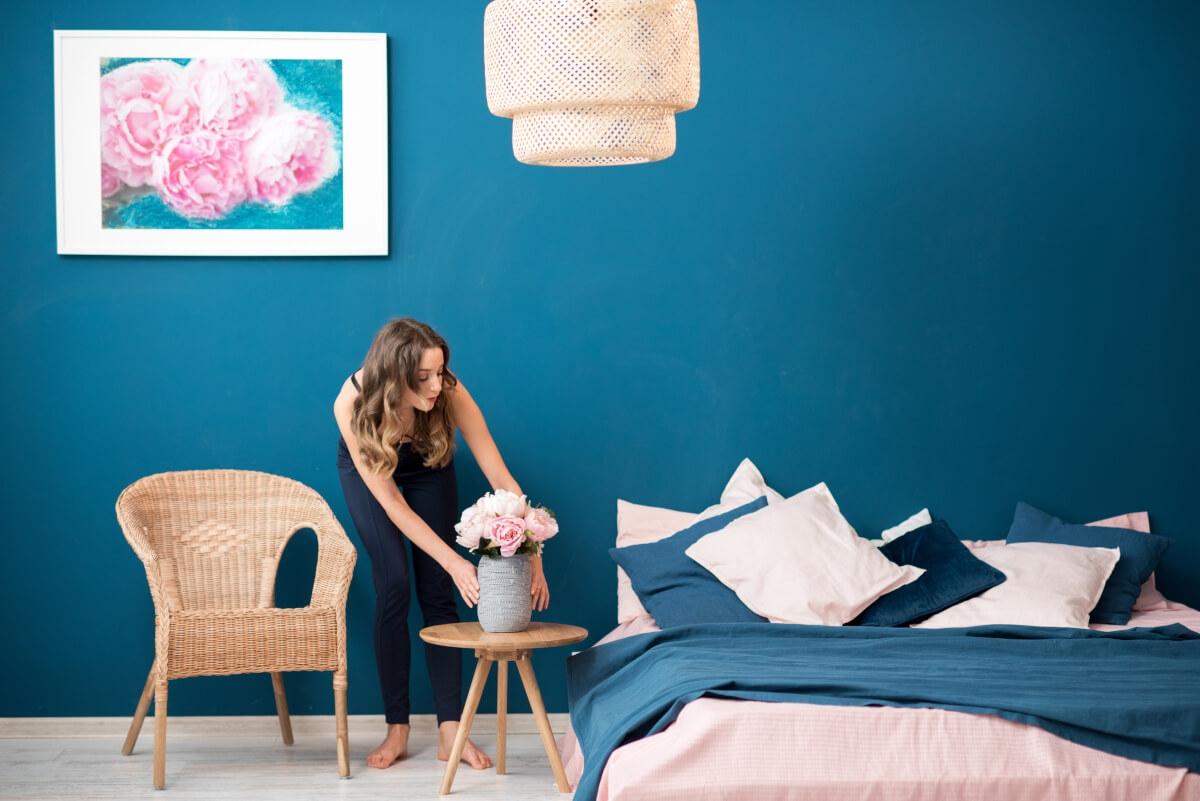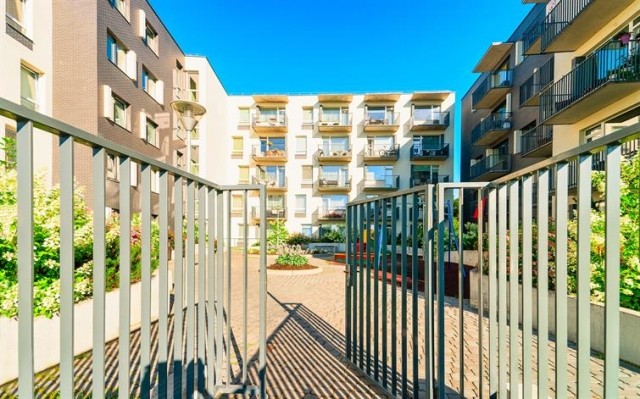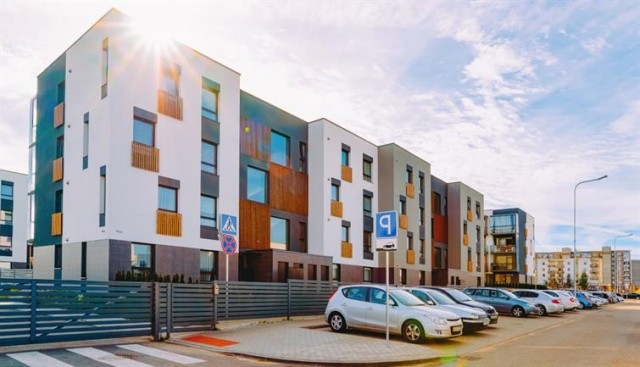Renting for the first time is an exciting journey, but it can come with its challenges. Questions about utilities, groceries, sharing space with a roommate, and more may run rampant in your head throughout the moving process. This new renter guide will make your transition into your new home as smooth as possible and answer all your burning questions.
What Essentials Do I Need for My First Apartment?
With all the checklists and mental notes you’ve made of things to bring to your new space, there will undoubtedly be something that you missed. Whether it be band-aids or a hammer, here is a list of necessities you may have forgotten in your planning but will eventually need in your home.
- Tool kit (hammer, nails, screwdriver, etc.)
- Measuring tape
- Cleaning supplies (glass cleaner, disinfecting wipes, multipurpose cleaner)
- Dishwashing detergent
- Laundry detergent
- Laundry basket
- Trash can
- Trash bags
- Toilet plunger
- Toilet paper
- Vacuum
- Mop
- Broom
- Clothing hangers
- First-aid kit
- Ice packs
- Painkillers
- Thermometer
- Personal care items (shampoo, soap, etc.)
- Fire extinguisher
- Flashlights
While this list may seem like a no-brainer, when you’re thinking about decorating, buying a new coffee machine, or shopping for a new mirror, these items can easily slip your mind. Everyone is different so apartment must-haves will vary from person to person, but these are just a few items that are essential for first-time renters.
Managing Apartment Utilities

Utility use in your new space can be the reason for such a large bill at the end of the month. Heavily running appliances like the washer, dryer, dishwasher, and your AC unit are just a few of the many items that could be increasing your energy bills without you even knowing. Understanding how your utilities work in your new apartment community is the key to saving your money and lowering your stress.
Do you live in an all-utilities paid apartment?
If your new home has utilities like water, electricity, internet, and more bundled up into your rent payment, that’s great! It’s just one less thing you have to worry about when you’re getting settled in your space.
If your community does not bundle utilities with your rent, it’s no big deal; you just have to understand your situation. Some apartments will suggest different providers and tag this price on top of your rent payment, or they will allow renters to choose their own providers.
This begs the question, what utilities do I need? As a tenant, the basic utilities you need are water, electricity, trash, and internet. Other extra utilities like security systems and gas can differ from community to community depending on the type of appliances or place you live. Providers make the set-up process of these utilities very simple- they know you’re going through a stressful time! Make sure to set service dates and get your payment ready before you move in so on your move-in day you can make sure your utilities are running smoothly.
The most important thing you can do when it comes to your utilities is to read over your lease before you sign it and maintain communication with your landlord or property manager. If it’s important to you to live in an all-bills-paid apartment, you should know that the apartments you are touring include this consideration. Voice your needs; you should be getting what you pay for!
Grocery Shopping Tips for New Renters

Cooking can be a daunting task to take on for first-time renters. It’s tempting to make a pack of instant noodles and call it a meal (even though we all know we need more nutrition than that). Even if you have meals in your wheelhouse ready to whip up in a couple of short hours or you’re new to moving around in a full kitchen, understanding grocery necessities is essential to make sure you’re getting settled in your new place.
Know where to shop
You have no doubt picked out your new apartment based on several factors, but one of the biggest is probably location. Because of this, you most likely have an idea of the many grocery stores that surround you. Knowing the stores that are closest to you, offer the food you want, and are affordable will help you decide which store to shop at. The bottom line: research before you start spending your money.
What are grocery and kitchen staples?
Dishware, glassware, and cookware are everyday items that you need in your space. Here are a couple of kitchen supplies that may have slipped your mind:
- Knife set
- Cutting boards
- Measuring cups
- Colander
- Can opener
- Aluminum foil and parchment paper
- Food storage containers
- Mugs
- Utensil set
No two people go to the grocery store and buy the same items on any given day; however, there are grocery staples that you need in your kitchen if you want to make a good meal.
- Milk
- Eggs
- Bread
- Salt and pepper
- Spices
- Olive oil
- Condiments (ketchup, mustard, mayo, etc.)
- Sugar
- Flour
- Butter
- Canned foods
- Pasta
- Rice
- Coffee
- Tea
- Water bottles
Your grocery list can become longer and more personalized as you get settled in your new space, but for the first grocery run in your new apartment, this list gets you everything you need.
Sharing Your Space

Renting with a roommate is an excellent way to split costs and save money in your first space. Whether you’re living with a friend or a stranger, there are steps you can take to ensure sharing your space does not become challenging.
Find the right roommate
You may be best friends with someone but have different living habits; you could be very tidy, and your friend be on the messier side. Whatever your situation may be, ensuring you are compatible with your new living partner is essential when it comes to sharing space. Some steps you can take to test this relationship is conducting interviews with potential roommates, talk with their old landlord or property manager to understand how they treated their last space, or conduct a background check. Living with another person can be one of the most challenging parts of renting for the first time, however making sure you live similarly to your new roommate can make your transition smoother.
Establish ground rules before move-in
Whether you’re establishing quiet hours in your home or dividing up tasks like cleaning the dishes or taking out the trash, setting rules with your roommate is a good way to make sure you set expectations with each other. Household rules like having guests over, having the TV on or loud during a certain time of day, or deciding how to split costs between the two are a couple of examples of good conversations to have with your roommate before move-in day.
Keeping constant communication with your roommate is another way to make sure there are no misunderstandings. Having no communication with your roommate or no understanding of their situation can lead to hostility. You don’t want to be miserable in your own home, so setting up weekly check-ins is not a bad idea to ensure neither you nor your roommate are frustrated.
Turn Your House into a Home

Unpacking is arguably one of the worst parts of moving. Stacks of boxes in all the rooms and an empty space may make you feel like you have no idea where to start. To not feel so overwhelmed, unpack your things box by box and room by room. There is no right time frame for unpacking, so take however long you need to feel comfortable!
After all that preparing, now for the fun part: decorating! Beginning your apartment decorating journey can feel like a task rather than an outlet to show off your personal interior design skills. Picking out big pieces of furniture, like a couch, ottoman, or dining table is a good way to get a feel for the rest of the room. Creating mood boards for smaller spaces like your bedroom or bathroom can help you decide on a color scheme, items you want in the space, and what, if anything, you want to put on the walls. Your home décor is an extension of yourself, so don’t stress over it, just be you!
Moving Made Simple with Apartments.com
Moving can be a stressful task, but Apartments.com makes it easy to find the right place for you. With tools to narrow your search for apartments based on price, location, and amenities, you can find your next space in a matter of minutes. Ready to begin your search? Let’s go!
FAQs
What should I do before moving into my apartment?
One of the most important things to do before moving into your apartment is to budget your expenses. Use the Apartments.com rent affordability calculator and the 50/30/20 rule to calculate and budget easily. Other things you should do before moving are pack all your essentials and personal care items, go through your clothes and belongings and get rid of things you don’t need, and double check that there are no other extra fees or charges you need to pay. On move-in day, make sure to take pictures of the walls, floors, cabinets, appliances, and windows in order to document any damage in case of added fees if or when you move out.
What essentials do I need for my first apartment?
There are multiple essentials to bring with you to your first apartment. Take it room by room when you are thinking about what essentials you may need. Start with the kitchen, then the living room, then the bathroom, and so on. Making sure you have all you need in your new place will make your transition as smooth as possible.
Should I get renters insurance for my first apartment?
Renters insurance protects you as a renter and your personal belongings from damage and theft. In addition to this, it provides liability coverage in case of an unexpected event. Renters insurance can be helpful when it comes to protecting yourself from legal and financial damage. Some landlords require tenants to have renters’ insurance in their lease; however, it is not required by law. You should do your own research and decide if renters’ insurance is right for you based on coverage types and companies.
How do I find a good roommate?
Good roommates will make your home life a whole lot easier. In order to live full-time with someone, you have to be compatible. When searching for a roommate, make sure that your lives are somewhat aligned (you go to sleep at the same time, you both wake up early/late, you are both clean, etc.). Establishing these parameters before you move in together will ensure that you and your roommate will get along well.






